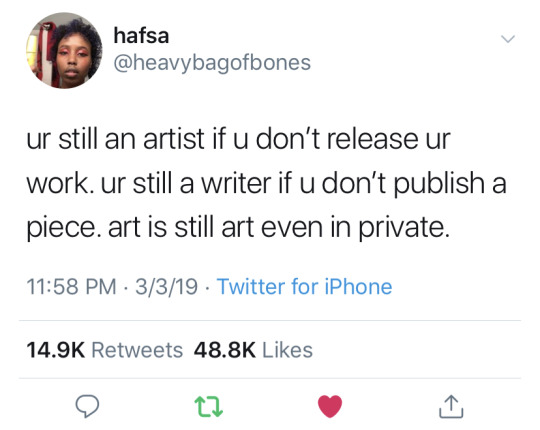Freelance writer-for hire. A variety of pieces will be stored here to serve as examples for clients, as well as information on how to hire me.
Don't wanna be here? Send us removal request.
Photo
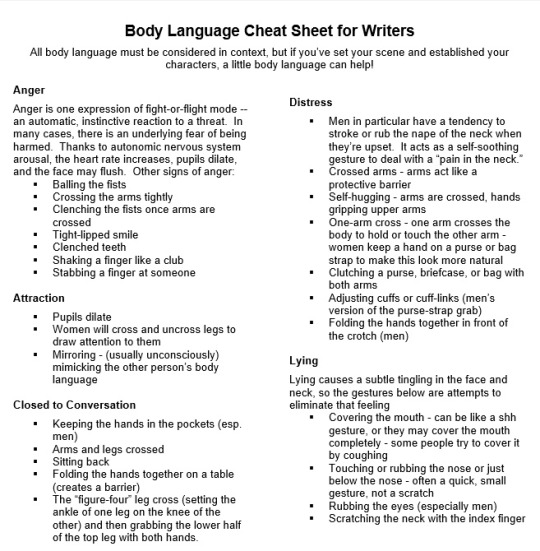
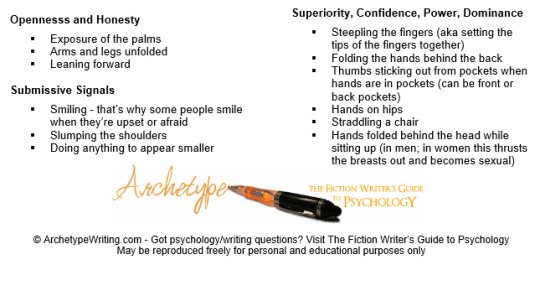
Body Language Cheat Sheet for Writers
As described by Selnick’s article:
Author and doctor of clinical psychology Carolyn Kaufman has released a one-page body language cheat sheet of psychological “tells” (PDF link) fiction writers can use to dress their characters.
467K notes
·
View notes
Text
5 frustrating workshop rules that made me a better writer
Throughout the 15 workshops I joined in college and grad school, I encountered two types of writing rules.
First, there were the best-practice guidelines we’ve all heard, like “show don’t tell.” And then there were workshop rules, which the professor put in place not because they’re universal, but because they help you grow within the context of the workshop.
My college’s intro writing course had 5 such rules:
No fantasy, supernatural, or sci-fi elements.
No guns.
No characters crying.
No conflict resolution through deus ex machina.
No deaths.
When I first saw the rules, I was baffled. They felt weirdly specific, and a bit unfair. But when our professor, Vinny, explained their purpose (and assured us he only wanted us to follow the rules during this intro workshop, not the others to come), I realized what I could learn from them.
1. No fantasy, supernatural, or sci-fi elements.
Writers need to be able to craft round characters, with clear arcs. While you can hone those skills writing any type of story, it can be more difficult when juggling fantastical elements, because it’s easy to get caught up in the world, or the magic, or the technology, and to make that the focus instead of the characters. So Vinny encouraged us to exclude such elements for the time being, to keep us fully focused on developing strong, dynamic characters.
2. No guns.
Weapons have a place in many stories, but when writers include a gun, they often use it to escalate the plot outside of the realm of personal experience and into what Vinny called “Hollywood experience.” He wanted us to learn how to draw from our own observations and perceptions of life, rather than the unrealistic action, violence, and drama we’d seen in movies, so he made this rule to keep us better grounded in our own experiences.
3. No characters crying.
When trying to depict sadness, writers often default to making characters cry. While there’s nothing inherently wrong with that, tears are just one way to show grief, and they aren’t always the most subtle or emotionally compelling. That’s why Vinny challenged us to find other ways to convey sadness — through little gestures, strained words, fragile interactions, and more. It was difficult, but opened us up to depicting whole new gradients of grief and pain.
4. No conflict resolution through deus ex machina.
This is the only one of the rules I’d say is generally universal. Meaning “God from the machine,” deus ex machina is a plot device where a character’s seemingly insurmountable problem is abruptly resolved by an outside force, rather than their own efforts. These endings are bad for various reasons, but Vinny discouraged them because he wanted us to understand how important it was for our characters to confront their struggle and its consequences.
5. No deaths.
Death is inherently dramatic and can be used to good effect, but many writers use death as crutch to create drama and impact. Writers should be able to craft engaging, meaningful stories, even without killing off their characters, so this rule challenged us to find other methods of giving weight to our stories (such as through internal conflict).
How these rules helped me grow as a writer
First things first, I’ll say it again: apart from #4 (deus ex machina), these rules were never meant to be universally applied. Instead, their purpose was to create temporary barriers and challenges to help us develop key skills and write in new, unfamiliar ways.
For me, the experience was invaluable. I liked the way the rules challenged and stretched my abilities, driving me to write stories I’d have never otherwise attempted. They made me more flexible as a writer, and while I don’t follow the rules anymore (I LOVE me some fantasy), I’ll always be thankful for how they shaped my writing.
My recommendation to you?
Give some of these rules a shot! Follow them temporarily while writing 2-4 stories — but remember to always keep their purpose in mind, because the rules themselves will only help if you understand what they’re trying to achieve.
Write with purpose, and you’ll always be growing.
— — —
For more tips on how to craft meaning, build character-driven plots, and grow as a writer, follow my blog.
11K notes
·
View notes
Text
Color Synonyms
White
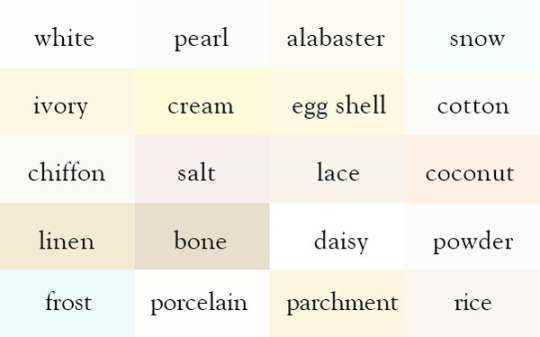
also: pale; blanched; sallow; pallid; waxen; spectral; translucent; albino;
Grey
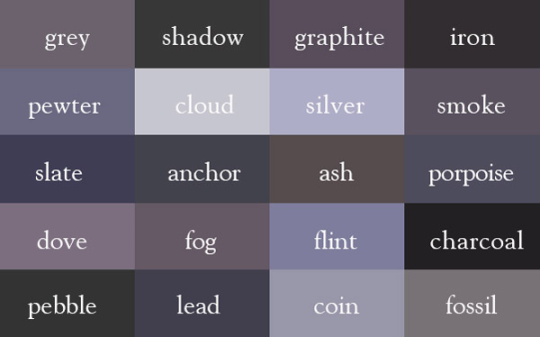
also: dust; stone; pepper;
Black

also: coal; slate; dusky; ebon; shadow; murky;
Tan
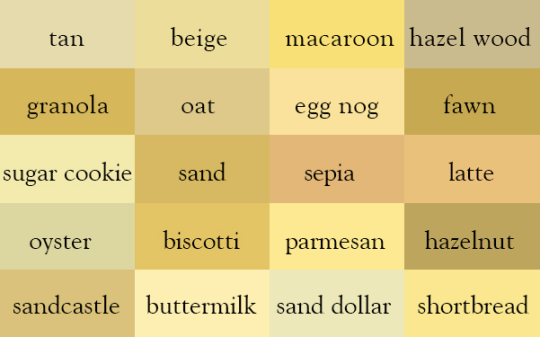
also: flesh; khaki; cream; tawny;
Brown
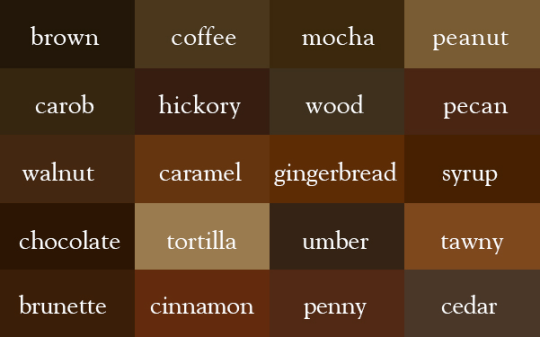
also: henna; russet; sepia; chestnut; cocoa; drab; bronze;
Red
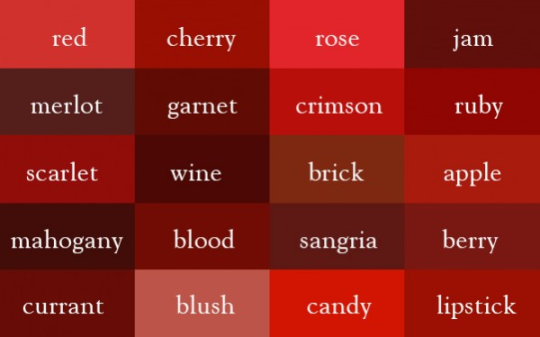
also: terracotta ; rouge; carmine; fire-engine; ruddy
Orange
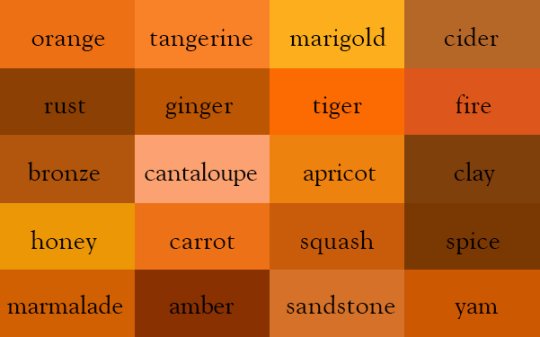
also: pumpkin ; rust ;
Yellow

also: sunny; amber; saffron; hay; straw; platinum;
Green
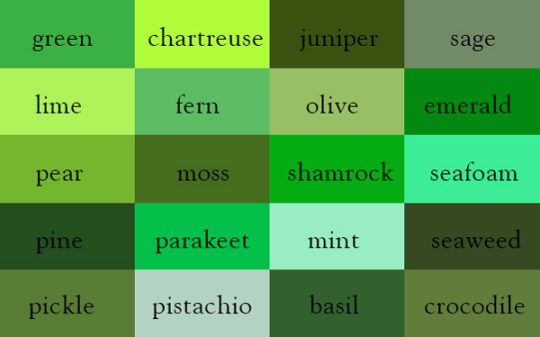
also: viridescent; grass; jade; forest;
Blue
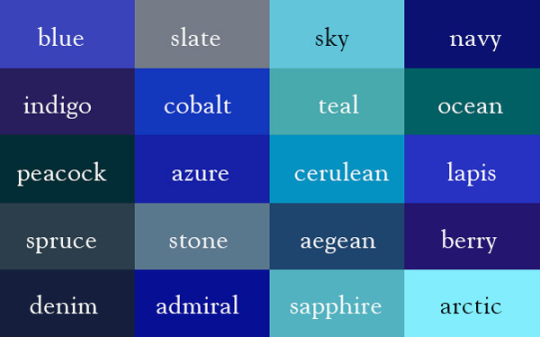
also: turquoise; cyan; ultramarine; royal; aqua; aquamarine;
Purple
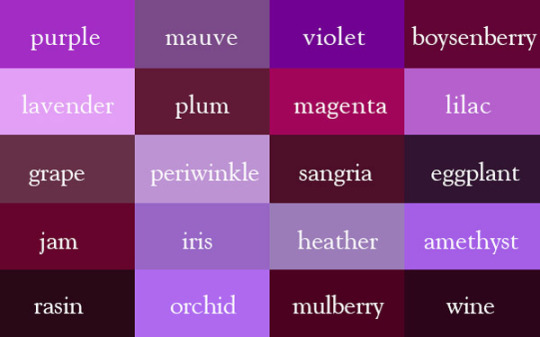
also: berry; amaranthine;
Pink

also: flushed; candy; cherry blossom; petal pink ;
—– source: http://ingridsundberg.com/
—–additional synonyms added by me
241K notes
·
View notes
Text
some fucking resources for all ur writing fuckin needs
* body language masterlist
* a translator that doesn’t eat ass like google translate does
* a reverse dictionary for when ur brain freezes
* 550 words to say instead of fuckin said
* 638 character traits for when ur brain freezes again
* some more body language help
(hope this helps some ppl)
227K notes
·
View notes
Text
NaNoWriMo Prep: How to Write 2000 Words a Day
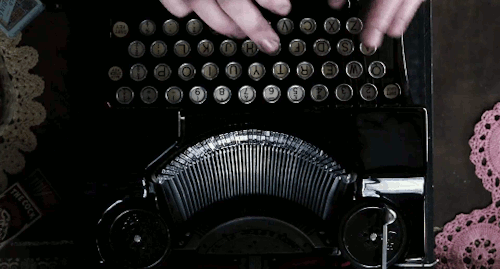
Two thousand is a big number. Sitting down to write 2000 words can be extremely intimidating, so the first thing you should do is make that number friendlier.
Write 500 words in 4 writing sessions.
Chop up that big, intimidating number. Start with a goal of 500 words. In one session, with no breaks, write them all. Take a break, then write the next 500. Repeat until you reach at least 2000.
If you write 650 words in one session, don’t aim for 350 in the next. Let those extra words add up. A few hundred extra words each day will get you to 50k quicker than you could imagine.
I recommend timing your sessions, aiming for 20 minutes each time. The deadline will help you get the words out, With 10 minute breaks between each session, you can reach your 2000 word goal in two hours. Which brings me to the next point:
Write fast.
Don’t stop and think about your words. Don’t go back and improve a previous sentence. Save all of your edits for later. Focus on writing as quickly as possible, throwing everything you have at that blank page. This will actually help boost your creativity. Make your brain work so fast, be so focused, that it doesn’t have any space to doubt itself and you’ll be amazed at what you can come up with.
But don’t worry if you can’t write 500 words in 20 minutes on day one. Writing quickly is a skill and it will take a few days of training.
Let the words suck.
This is absolutely key if you want a high word count. When you’re writing an entire chapter in a day, you shouldn’t expect the words to be beautiful. You’re not aiming at lyrical prose. You’re mining raw material that you can work into art later.
Letting the words suck can include:
Writing [something happens here] in place of a scene.
Letting yourself use cliches as shorthand.
Dialog that is really exposition.
Long descriptions of things that don’t matter.
Letting your characters ramble until you discover what it is they actually need to say.
As long as there are 2000 words and they relate to your story, they’re exactly what you need. And if you hate having bad words on a page, once you have your 2000 for a day, you can go back and fix all of it. Take all the time you need. Just reach that word count first.
Tip: if you do edit at the end of each day, make that a separate document from your official NaNo doc. This way, you can trim scenes, descriptions, and dialog without worrying about its effect on your word count. (If you make a scene/description/sentence longer, feel free to include that in your NaNo doc.)
Don’t know what to write next?
So you’ve written 1200 words, completed a scene, and you have no idea where the story is going next. Here are some things you can do to get those 800 words in anyway:
Go to writeordie.com and FORCE the words out.
If that doesn’t work, reread the scene you’ve just written and see if you’re missing some obvious foreshadowing, some clue as to where the story’s headed. (You can also add a few lines to bulk up your wc.)
If that fails, take a walk and let the fresh air usher a solution to you.
If that fails, skip the next section. Write another scene. Go where the story is waiting for you. Come back to the other scene at a later time.
Helpful tip:
Instead of breaking your writing session into four parts, break it into five. Use your first writing session to sketch out an entire chapter, like an outline, but with bits and pieces of dialog and description. Figure out where you’re headed and a couple of key stops along the way. Knowing what you’re writing towards will make doing the actual, fleshed-out writing much easier and quicker.
You can also do an outline for the next day’s writing after you’ve gotten your 2000 words for the day in. Future you will be extremely pleased.
9K notes
·
View notes
Text
“Start writing, no matter what. The water does not flow until the faucet is turned on.”
— Louis L’Amour (via wordsnstuff)
9K notes
·
View notes
Text
i’ve been doing my homework on how to break into a writing career and honestly. there’s a Lot that i didn’t know about thats critical to a writing career in this day and age, and on the one hand, its understandable because we’re experiencing a massive cultural shift, but on the other hand, writers who do not have formal training in school or don’t have the connections to learn more via social osmosis end up extremely out of loop and working at a disadvantage.
162K notes
·
View notes
Text
i’ve been doing my homework on how to break into a writing career and honestly. there’s a Lot that i didn’t know about thats critical to a writing career in this day and age, and on the one hand, its understandable because we’re experiencing a massive cultural shift, but on the other hand, writers who do not have formal training in school or don’t have the connections to learn more via social osmosis end up extremely out of loop and working at a disadvantage.
162K notes
·
View notes
Text
A Few Tips On Writing Chapters
Give each chapter a descriptive title.
Especially if you find yourself at sea when deciding how exactly to chop your story into pieces. Even if you don’t want to use chapter titles in your final draft, they’re of enormous use when you’re still figuring out exactly what the shape of your story is. By giving your chapter a descriptive title, you’re giving your chapter a focus and a particular story for your chapter to tell.
Make sure each chapter has its own self contained narrative arc.
This is not to say that every novel must be episodic, but that each section should have its own beginning, middle, and end. It should have set up, build up, and resolution. It should ask a question an implicit question at the beginning and provide a slightly more explicit answer at the end.
Example: one chapter in my book is just 500 words. Two new characters drive into town, get out of a car, knock on a door, and they say their names. The beginning is the introduction of the mystery of these characters. It’s the question “who are these people?” As they drive, you see them and where they are going, which builds towards the answer. As a resolution, you get their names.
You wouldn’t call this a “short story” by any means, but it does have a firm beginning, middle, end. It is a contained unit.
A chapter break can–and sometimes should–come in the middle of a scene.
Twists and cliffhangers can appear at the end of novels, so it would be silly to say you couldn’t end a chapter that way, too. Cliffhangers and twists are usually both a result of other plot points, and the cause of a new problem. Narratively, they function both as the ending of one thing and the beginning of another, so they make for great chapter breaks. Separating the scene at a cliffhanger is often better/cleaner than lumping the entire scene into one chapter.
Example: Alex is warned to stay away from a dangerous cliff. Alex gets adventurous and wanders toward cliff. Alex falls off of cliff. Beginning. Middle. End.
Alex is actually hanging from cliff! Alex figures out a way to get back to solid ground, struggles. Alex makes it back to solid ground. Beginning. Middle. End.
You want your readers to “just one more chapter!” their way through your book. Stuffing moments of high tension into the middle of chapters that resolve neatly won’t keep them turning pages.
Always end your chapters on a point of intrigue.
Using points of tension to bookend chapters is important because chapter endings are usually where readers put a book down during a reading session. They’re very naturally places to close the cover and walk away.
As a writer, you don’t want this. You absolutely don’t want to give your reader great places to put the book down, because you need them to pick the book up again as soon as possible. Not the next day, or the next week, (or never), but while they have a spare minute during their commute, or during their lunch break, or under their desk in class.
You want to encourage this by taking that perfectly natural endpoint, that place they expect to be able to put the book down, and forcing them to take even a tiny peak at the next chapter.
This doesn’t mean ending every chapter on a verifiable cliffhanger, but there has to be something. A character can solve a mystery. A new character can appear. There can be a moment of irony. A new idea. Just so long as it’s something that will make the reader think “I need to know what happens next.”
4K notes
·
View notes
Text
controversial writing tip
open a document and start writing
256K notes
·
View notes
Note
What universes can you write for?
I am completely comfy with the Buffy-verse, canon and original characters, Marvel Universe, canon and original. I'd be willing to take a shot at DC universe. Star Trek and Star Wars (though for the later I'd have to source books and such), NCIS, Criminal Minds, and CSI if mystery-crime-science is your thing, Dragon Riders of Pern, and Wheel of Time.Do keep in mind, if you propose an idea, I'm willing to give it a shot and research my way into a story. Someone requested a Warhammer 40k story, and I was perfectly happy to interrogate my friends who play or have read the books.I currently have a wait-list about 3 people long, though they're all relatively short pieces. The longest work I have done was Guardians of the Galaxy fic, and it was in the ballpark of 65k words.Inquiries are welcome, and I'm willing to consider just about anything proposed to me. Contact me through Tumblr or send me a message at [email protected]. Thanks for the interest!
1 note
·
View note
Text
Alternatives for 25 overused words in writing
1. Interesting- note worthy; thought-provoking; fascinating; attracting; appealing; attention-grabbing; captivating; gripping; invigorating; engrossing; engaging; electrifying.
2. Beautiful- striking; stunning; magnificent; lovely; charming; gorgeous; radiant; dazzling.
3. Good- acceptable, wonderful, exceptional; positive; brilliant; first-rate; notable; stellar; favorable; superb; marvellous; prime.
4. Bad- awful; lousy; poor; unacceptable; crummy; dreadful; rough; inferior; substandard; atrocious; appalling; dreadful; defective.
5. Look- glance; fixate; observe; stare; gaze; peer; scan; watch; study; browse; eye; glimpse; review; inspect.
6. Nice- lovely; superior; pleasant; satisfying; delightful; likeable; agreeable; correct; adequate; swell; fair; okay; approved.
7. Very- extremely; exceedingly; exceptionally; immensely; tremendously; abundantly; particularly; remarkably.
8. Fine- satisfactory; worthy; respectable; exquisite; suitable; well; imposing; decent; admirable; praise-worthy; decent.
9. Happy- cheerful; delighted; pleased; content; amused; thrilled; elated; thrilled; ecstatic; on cloud 9.
10. Really- genuinely; truly; honestly; actually; undoubtedly; certainly; remarkably; incredibly; downright; unquestionably; extremely.
11. Sad- miserable; gloomy; devastated; down at heard; distraught; distressed; dispirited; sorrowful; downcast; feeling blue; desolate.
12. Big- massive; huge; giant; gigantic; enormous; large; colossal; immense; bulky; tremendous; hefty; sizable; extensive; great; substantial.
13. Shocked- taken aback; lost for words; flabbergasted; staggered; outraged; astonished; astounded; stunned; speechless; appalled.
14. Small- tiny; petite; mini; miniature; microscopic; minuscule; compact; pocket-sized; cramped; puny; undersized; limited; meager; modest; minute; pint-sized.
15. Angry- irate; enraged; touchy; cross; resentful; indignant; infuriated; wound-up; worked-up; seething; raging; heated; bitter; bad-tempered; offended; frustrated.
16. Know- understand; comprehend; realize; learn; perceive; recognize; grasp; sense.
17. Change- alter; transform; replace; diversify; adjust; adapt; modify; remodel; vary; evolve; transfigure; redesign; refashion; advance; transition; shift; adjustment.
18. Old- aged; ancient; matured; elderly; senior; veteran; decrepit; seasoned; venerable; past one’s prime; doddering; senile.
19. Think- ponder; reflect; conceive; imagine; contemplate; consider; determine; realize; visualize; guess/assume; conclude; envision.
20. Funny- comical; ludicrous; amusing; droll; entertaining; absurd; hilarious; silly; whimsical; hysterical; joking; witty; facetious; slapstick; side-splitting; knee-slapping.
21. Go- move; proceed; advance; progress; travel; walk; journey; depart; exit; flee; make one’s way; clear out; get underway.
22. Give- grant; donate; hand-out; present; provide; deliver; hand over; offer; award; bestow; supply with; contribute to; send; entrust.
23. Get- acquire; obtain; receive; gain; earn; gather; collect; buy; purchase; attain; score; secure; take possession of; grab.
24. Easy- effortless; simple; clear; smooth; straightforward; uncomplicated; painless; accessible; apparent; basic; plain; child’s play; facile; elementary; cinch.
25. Fast- agile; brisk; rapid; nimble; swift; accelerated; fleeting; high-speed; active; dashing; winged; hurried; turbo.
133K notes
·
View notes
Text
I feel like when you’re writing, organizing chapters and dialogue is easy
but jfc, the amount of time it takes to constantly keep people moving and make sure they’re in the right spaces and trying to come up with wording for it is always such a shock.
Like, fuck, I made you pick up a coffee cup, you need to put it down at some point. also I can’t remember what I dressed you in, can you push up your sleeves? I don’t remember if you even have your shirt on.
and YOU. YOU OVER THERE, you got out of your chair earlier, but did you come back yet? Are you coming back? Where did you even go and why’d you get up? Fuck, I can’t make you sit down again already, you just stood up, go…over there. go get more coffee. Did you bring your mug with you? fine. bring the pot to the table and—wait, wasn’t the coffee pot already over here? shit, hold on, I need to go back and re-read and re-write
165K notes
·
View notes
Text
Quick Guide to Punctuating Dialogue
“This is a line of dialogue,” she said.
“This,” he said, “is a sentence split by a speech tag.”
“This is a full sentence,” she said. “This is a new sentence.”
“This is a sentence followed by an action.” He smiled. “They’re separate sentences, because I didn’t speak by smiling.”
21K notes
·
View notes
Text
ATTENTION WRITERS
Google BetaBooks. Do it now. It’s the best damn thing EVER.

You just upload your manuscript, write out some questions for your beta readers to answer in each chapter, and invite readers to check out your book!
It’s SO easy!
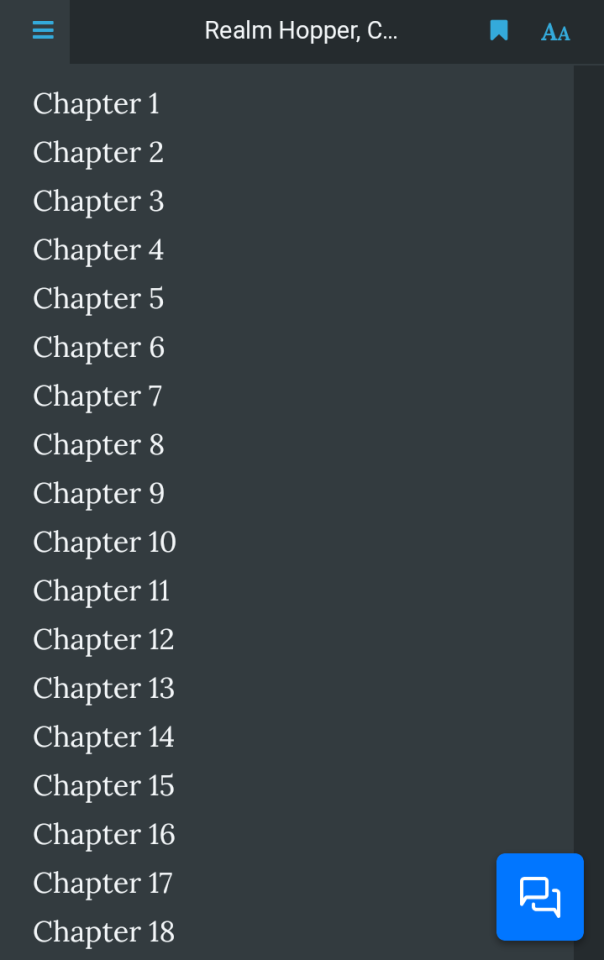
You can even track your readers! It tells you when they last read, and what chapter they read!

Your beta readers can even highlight and react to the text!!!
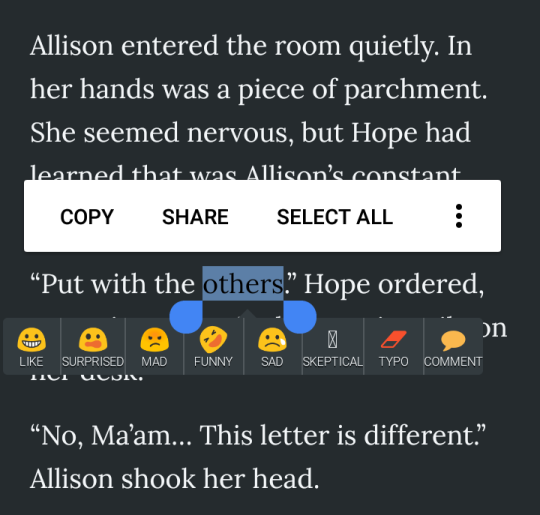
There’s also this thing where you can search the website for available readers best suited for YOUR book!
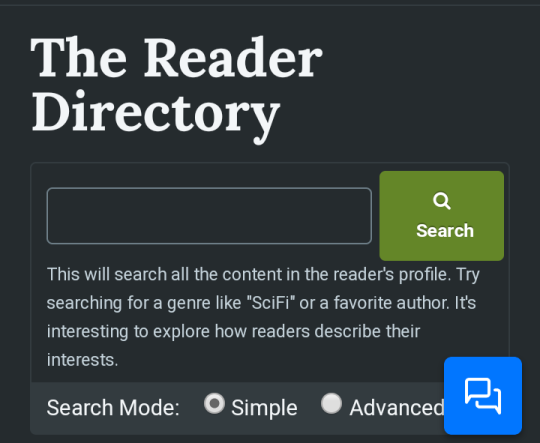
Seriously guys, BetaBooks is the most useful website in the whole world when it comes to beta reading, and… IT’S FREE.
251K notes
·
View notes

